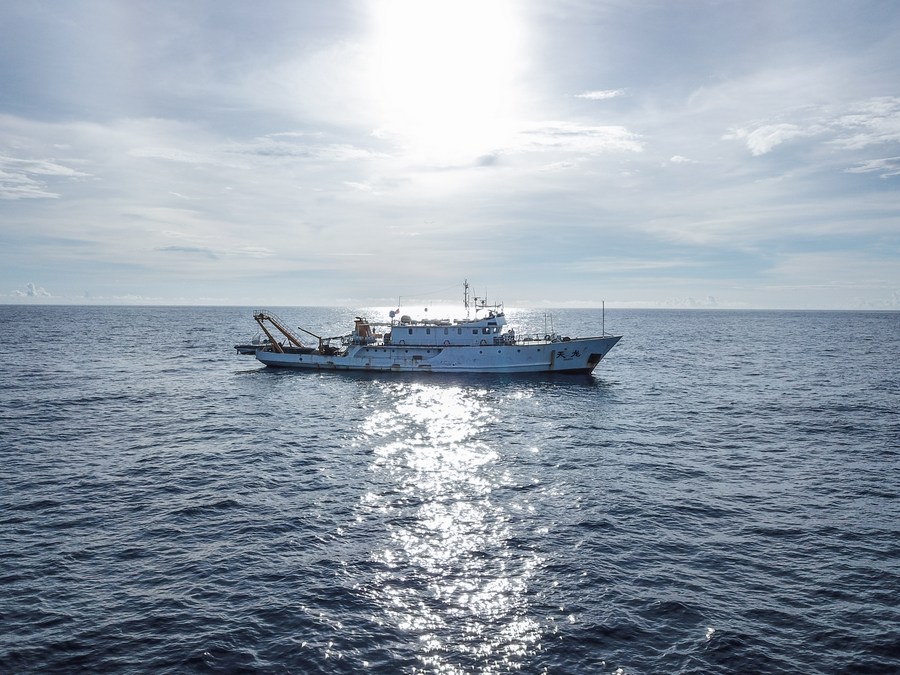By Zhou Wenxing
The Seawolf-class nuclear attack submarine USS Connecticut was damaged after a collision with an unknown underwater object while operating in the South China Sea (SCS) on October 2, according to an oversimplified statement released by the U.S. Pacific Fleet on October 7, five days after the incident took place. In view of the way the U.S. deals with this incident, one cannot help but ask what the U.S. intention is in the SCS.
The U.S. intention of involving the SCS issue was originally driven by the economic factor of the sea lanes passing through the SCS, regarded as the world's busiest and most important maritime waterway. As the findings by the Washington, D.C.-based think tank the Center for Strategic & International Studies (CSIS) suggest, the SCS carried one-third of global shipping with an estimated value of $3.4 trillion in 2016.
The same CSIS report shows that nearly six percent of U.S. total trade in 2016 transited through the SCS sea lanes. It is thus understandable that all regions and countries, including the U.S., that are economically dependent on this maritime waterway are concerned about the safety and stability of the SCS.

Aerial photo taken on July 13, 2020 shows an expedition vessel in the South China Sea. [Photo by Zhang Liyun/Xinhua]
However, one may find that American intention in the SCS is far more than merely economically oriented by casting a glance at U.S. policy changes at some critical historical junctures. More specifically, the American intention on the SCS issue is increasingly being driven by political and security factors as China gains more leverage in the regional and global arena.
When the Chinese economy was rapidly developing around 2010, the Barack Obama administration introduced its "Asia-Pacific Rebalancing Strategy" to balance against China's rising influence and accordingly stepped up its intervention by conducting alleged "freedom of navigation" operations across the SCS.
During the July 2010 annual meeting of the ASEAN Regional Forum, then Secretary of State Hillary Clinton introduced some new elements to America's SCS policy, including "resolving disputes without coercion" and "support for a collaborative diplomatic process by all claimants."
Obviously, the U.S. policy change and its efforts to turn the disputes to its own advantage had contributed to rising tensions in the ensuing years in the region.
A more distinct policy change was made during the Donald Trump administration, which labeled China as a so-called strategic competitor and initiated a confrontational policy towards China. In July 2020, then Secretary of State Michael Pompeo announced that China's "claims to offshore resources across most of the South China Sea are completely unlawful," signaling a U.S. policy change from "taking no position" to "taking a position" intending to disrupt the order of the SCS.
It is evident that the more America treats China as a competitor or a rival, the more likely America would intervene in the SCS. A rising China that may revise the rules in the region, as claimed by American political elites, is not in line with U.S. national interests. What the U.S. really hopes to obtain is the "hegemony of navigation" rather than "freedom of navigation."
Since the Biden administration has inherited many policy elements from its predecessor, the U.S. Navy continues "freedom of navigation" operations across the SCS. But this policy would inevitably further complicate the regional situation. The growing U.S. military presence is likely to drag countries surrounding the SCS into a security dilemma, making it more difficult to solve the disputes among claimants.
In addition, the SCS, known as one of the most difficult underwater environments in the world, is becoming even more complicated and dangerous as more external powers become involved. The U.S. submarine collision incident is the result of excessive American involvement.
Alas, the U.S. is falling "victim" to its own SCS policy. Just as Chinese Foreign Ministry spokesperson Zhao Lijian said during a regular press conference on October 8, U.S. "freedom of navigation" is becoming "the root cause of this incident."
The author is an assistant professor at the School of International Studies, Nanjing University and a former Asia Fellow at John F. Kennedy School, Harvard University.

 中文
中文



